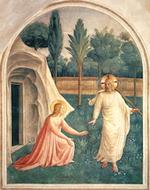Catechism of the Catholic Church
Share this paragraph of the Catechism:
Paragraph:
248 At the outset the Eastern tradition expresses the Father's character as first origin of the Spirit. By confessing the Spirit as he "who proceeds from the Father", it affirms that he comes from the Father through the Son. 77 The Western tradition expresses first the consubstantial communion between Father and Son, by saying that the Spirit proceeds from the Father and the Son (filioque). It says this, "legitimately and with good reason", 78 for the eternal order of the divine persons in their consubstantial communion implies that the Father, as "the principle without principle", 79 is the first origin of the Spirit, but also that as Father of the only Son, he is, with the Son, the single principle from which the Holy Spirit proceeds. 80 This legitimate complementarity, provided it does not become rigid, does not affect the identity of faith in the reality of the same mystery confessed.
Move forward or back a paragraph: Previous | Next
Where this paragraph appears in the Catechism:
TABLE OF CONTENTS
» |
PART ONE: THE PROFESSION OF FAITH |
» |
SECTION TWO: THE PROFESSION OF THE CHRISTIAN FAITH |
» |
CHAPTER ONE: I BELIEVE IN GOD THE FATHER |
» |
ARTICLE 1: "I BELIEVE IN GOD THE FATHER ALMIGHTY, CREATOR OF HEAVEN AND EARTH" |
» |
Paragraph 2. The Father |
» |
II. THE REVELATION OF GOD AS TRINITY |
Notes for the above paragraph:
77 Jn 15:26; cf. AG 2.78 Council of Florence (1439): DS 1302.
79 Council of Florence (1442): DS 1331.
80 Cf. Council of Lyons II (1274): DS 850.
English Translation of the Cathechism of the Catholic Church for the United States of America © 1997, United States Catholic Conference, Inc.






